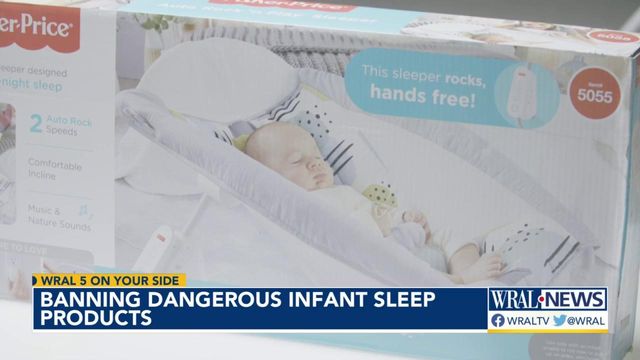5 On Your Side: Rules and guidelines changing to protect sleeping infants
There are products for infants on the market right now, maybe even in your home, that will be banned in a few weeks.
Posted — UpdatedThere are products for infants on the market right now, maybe even in your home, that will be banned in a few weeks.
Experts agree the ideal sleep environment for a baby is a flat, firm mattress that does not contain any blankets, toys or crib bumpers.
The Safe Sleep for Babies Act goes into effect Nov. 12 and bans dangerous products and certain marketing. The goal is to make it easier for parents to create a safe sleeping environment for their infants.
Lauren Morris works to help Duke University Hospital create safe sleeping spaces for new babies. Morris is a pediatric neurology resident and mom to a 9-month-old son.
A heartbreaking experience helped shape Morris’ dedication to this type of safety.
"This particular family I bonded with, I got to see them for their newborn visit, their one-month visit. Right before their two-month visit, I got a notification saying that one of my patients died, which was really shocking to me," Morris told 5 On Your Side.
The child’s suspected cause of death was Sudden Infant Death Syndrome, also known as SIDS.
"That’s so unimaginable," Morris said.
Experts believe unsafe sleeping environments often play a role in SIDS deaths.
Every year, 3,500 infants across the country die from sleep-related causes, including SIDS. This year has seen a major push to bring that number down.
"Unfortunately, we see too many deaths each year," said Consumer Product Safety Commission Chair Alex Hoehn-Saric.
Hoehn-Saric’s agency is on the frontlines of enforcing these new rules. He says some inclined sleepers that were not safe for sleep have just changed their marketing.
"People are quickly changing their advertising, but really all with a wink and a nod that they’re going to be used for sleep," Hoehn-Saric told 5 On Your Side. "This is just not safe for sleep."
"Parents may still use those places for babies to sleep," Megan Canady told 5 On Your Side.
Canady is with the UNC Collaborative for Maternal and Infant Health, working to promote safe sleep across the state.
She says the new guidance and changes will not only save lives but caution people they have to be careful with how they use some of the products still on the market and already in their homes.
Another measure not included in the act is a focus on critical ongoing education and support for parents.
"I think having proper funding to make sure that those conversations are being had so that parents understand, 'Well, why can’t my baby sleep in this,’ is really important too," Canady said.
The following resources can connect parents with new guidance and answer common questions and concerns:
Related Topics
• Credits
Copyright 2024 by Capitol Broadcasting Company. All rights reserved. This material may not be published, broadcast, rewritten or redistributed.






